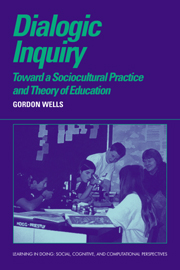Book contents
- Frontmatter
- Contents
- Conventions of Transcription
- Introduction
- Part I Establishing the Theoretical Framework
- 1 The Complementary Contributions of Halliday and Vygotsky to a “Language-based Theory of Learning”
- 2 In Search of Knowledge
- 3 Discourse and Knowing in the Classroom
- Part II Discourse, Learning, and Teaching
- Part III Learning and Teaching in the zpd
- Appendix I A Social Constructivist Model of Learning and Teaching
- Appendix II Categories for the Analysis of Discourse
- References
- Index of Authors
- Index of Subjects
- Title in the series
3 - Discourse and Knowing in the Classroom
Published online by Cambridge University Press: 09 November 2009
- Frontmatter
- Contents
- Conventions of Transcription
- Introduction
- Part I Establishing the Theoretical Framework
- 1 The Complementary Contributions of Halliday and Vygotsky to a “Language-based Theory of Learning”
- 2 In Search of Knowledge
- 3 Discourse and Knowing in the Classroom
- Part II Discourse, Learning, and Teaching
- Part III Learning and Teaching in the zpd
- Appendix I A Social Constructivist Model of Learning and Teaching
- Appendix II Categories for the Analysis of Discourse
- References
- Index of Authors
- Index of Subjects
- Title in the series
Summary
The centrality of language has run like a leitmotiv through the exploration of knowing and knowledge in the preceding chapter. Here I want to focus on it more directly, first by setting out the arguments for treating it as the very essence of education and, second, by considering in more detail the relationship between discourse and knowing. I shall then consider some of the implications of the preceding arguments for the discourse through which so many of the daily practices of learning and teaching are enacted in the classroom. Briefly, I shall propose that classrooms should become communities of inquiry, in which the curriculum is seen as being created emergently in the many modes of conversation through which teacher and students dialogically make sense of topics of individual and social significance, through action, knowledge building and reflection.
The Role of Language in Human Development
Vygotsky's contribution to our understanding of the central role of language in human development has already been spelled out in some detail in Chapter. It rests on the fruitful analogy he drew between material artifacts and signs: both function as tools to mediate joint, productive activity. Viewed in this way, language and other semiotic systems can be thought of as “psychological tools” that, through their inclusion in activity, radically transform participants' orientations both to the material situation and to their coparticipants.
From a phylogenetic perspective, we have already seen this transformative effect in the account that was offered, in Chapter 2, of the emergence of the different modes of knowing in the evolution from primate to contemporary humans.
Information
- Type
- Chapter
- Information
- Dialogic InquiryTowards a Socio-cultural Practice and Theory of Education, pp. 98 - 132Publisher: Cambridge University PressPrint publication year: 1999
